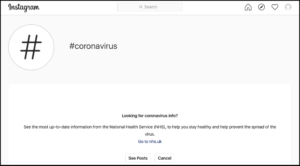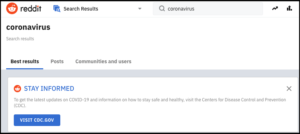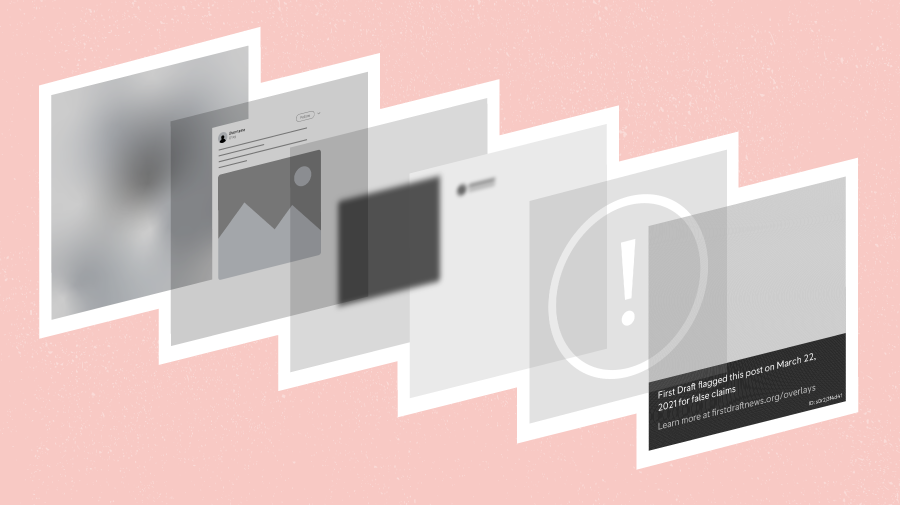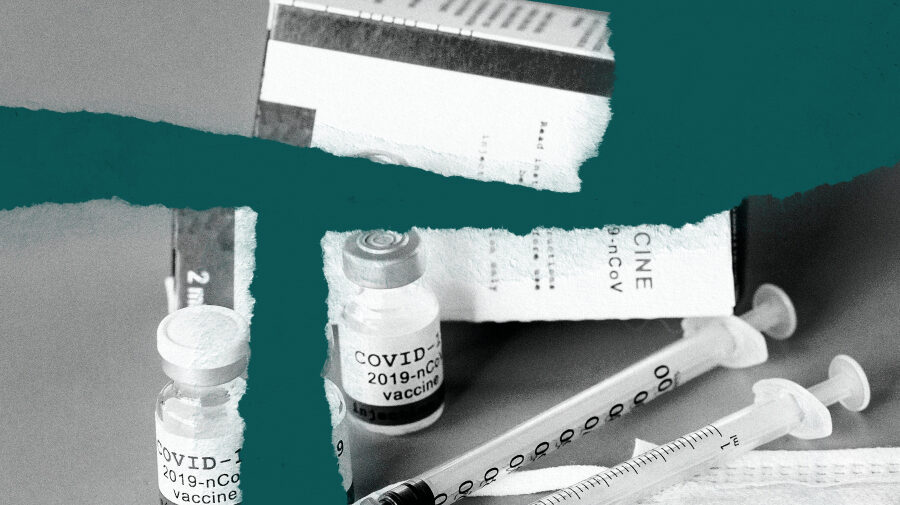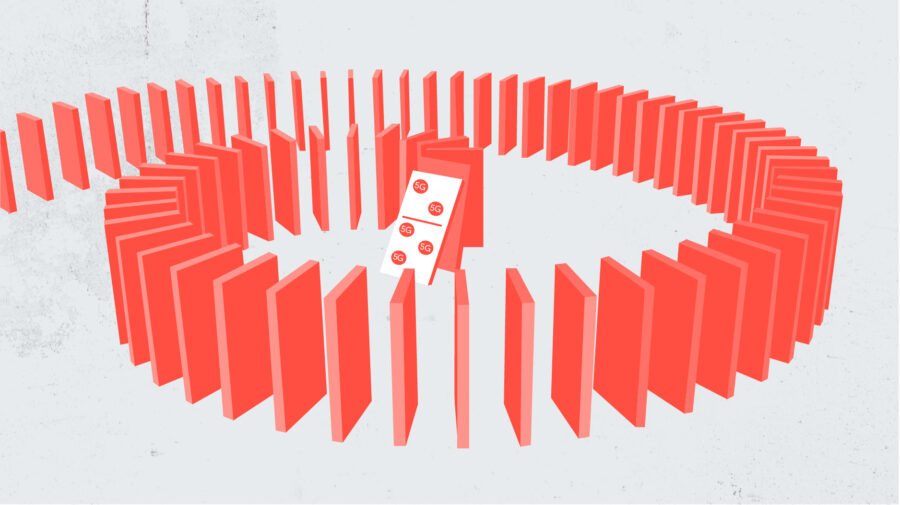This article is part of First Draft’s coronavirus resource hub and a series on health misinformation.
Social media platforms have come under increasing pressure to regulate misinformation hosted by their sites and the coronavirus pandemic seems to be spurring the type of action critics have long called for.
On March 16, Facebook, Google, LinkedIn, Microsoft, Reddit, Twitter and YouTube issued a statement saying they had joined forces to combat “fraud and misinformation about the virus”.
Facebook, Giphy, Microsoft, Pinterest, Slack, TikTok, Twitter and WeChat are participating in a WHO hackathon where developers are invited to build software solutions to address the crisis. Projects selected for public promotion will be announced on 3 April.
So what are various platforms actually doing? This article will be updated regularly with the latest news about the different measures.
Latest update: April 8 2020
The world’s largest social media platform has come under fire for its refusal to ban lies in political ads, but is taking a harder line when it comes to the coronavirus.
The emerging consensus, no matter the platform, is to provide as much quality information as possible while trying to limit the falsehoods. As of March 18, Facebook is running a ‘Coronavirus Information Center’, an initiative they hope will help people find information and tips, on top of existing measures introduced to knock back scams, ads and other sources of disinformation.
Ads which attempt to exploit the outbreak by selling ‘miracle cures’ or medical face masks at grossly inflated prices are banned, and when users search for ‘coronavirus’, Facebook shows a banner directing them to the WHO or their national health organisation.
As part of its third party fact-checking initiative, Facebook is labelling coronavirus misinformation with “fact check” labels. Mark Zuckerberg announced that the platform was also removing conspiracy theories related to Covid-19 that have been flagged by global health organisations, as well as providing the WHO with free ads.
As of March 23, Facebook has been connecting government health organizations and UN health agencies with its developer partners to guide them in using Messenger in their response to the pandemic. This could include developing automated responses to commonly asked questions.
Facebook has created a Messenger Coronavirus Community Hub with tips and resources to help users recognise scams and misinformation and prevent their spread. The platform also launched its digital literacy program, Get Digital, to help young people develop the necessary skills to safely navigate the internet, as people spend more time online due to social distancing measures.
On March 30, Facebook pledged $100-million to support journalists, in addition to the previous grants made to local news and fact-checkers. $25 million is in the form of an emergency grant for local news through the Facebook Journalism Project, and $75 million will go towards marketing to help make up publishers make up the shortfall caused by a decline in advertising revenue.
The following day, Facebook announced its Community Help feature to allow users to request or offer help to their neighbours, such as delivering groceries. The feature will initially be rolled out in the US, the UK, France, Australia and Canada, with other countries to follow in the coming weeks.
Facebook is keeping a running blog of updates here.
Google searches related to coronavirus show an “SOS Alert” banner, followed by news from mainstream outlets and information from recognised health organisations and governments. It is also promoting the WHO’s ‘do the five’ coronavirus-prevention campaign.
Like Facebook and Instagram, Google is blocking ads that capitalise on the pandemic, in line with its sensitive events policy. It has instituted a temporary ban on all ads for medical masks and respirators. The tech giant has also disabled app searches for ‘coronavirus’ on the Google Play Store.
On April 2, a leaked memo stated that Google would begin to allow some advertisers to run coronavirus-related ads across its platforms.
The company outlined its plan to start introducing political advertisers working directly on the topic. This includes “government entities, hospitals, medical providers, and NGOs who want to get relevant information out to the public,” according to the memo.
Google is removing misleading information and fake reviews about healthcare locations from Google Maps, using a combination of automated and manual review systems.
The company has a fact-check explorer (a crucial element of First Draft’s coronavirus debunk database) which lets anyone search for articles tagged as fact checks.
Google has launched a website, developed in partnership with the US government, to provide information and resources about the pandemic. It covers prevention tips, a map of areas affected by the outbreak and links to local health agencies, and is being made available in different languages.
On March 27, Google announced a $800+ million fund to support small- and medium-sized businesses, health organizations and governments, and health workers on the frontline of the pandemic.
Google is collecting all its updates about coronavirus here.
YouTube
As of March 19, YouTube has promised to promote verified, informative videos of coronavirus information on its homepage.
Similarly to Facebook, the Google-owned video sharing platform has introduced info panels from the WHO or to their national health organisations which appear when you search for coronavirus. It is also providing governments and NGOs with free ad space and removing harmful medical misinformation videos.
At the beginning of March, the platform began shutting down ads on videos about the coronavirus, in line with its advertising policy which sometimes demonitises videos discussing ‘sensitive events’ such as global health crises. YouTube has since slowly begun to allow ads on such videos following a backlash from creators, and will allow ads on videos by some creators, as well as on news partners’ channels.
On April 7, the platform announced that it would tighten its rules to ban conspiracy videos linking coronavirus to 5G. This was in response to a live-streamed interview with conspiracy theorist David Icke, in which he falsely linked the technology to the current health crisis.
Rumours and hoaxes are reportedly running wild in WhatsApp group chats, including through the medium of voice notes. However, due to the Facebook-owned messaging platform’s heavily encrypted structure, these communications can’t be monitored or moderated.
Facebook has said that it is trying to shut down spam accounts on the messaging app, using AI to identify accounts that send out automated messages.
The messaging platform, which has 1.6 billion users worldwide, has offered help to set up dedicated tip lines on the service for accurate health information.
On March 18, the messaging service launched the WhatsApp Coronavirus Information Hub, working with the WHO, UNICEF and UNDP to to keep its global users informed about the pandemic and, therefore, limit the spread of rumours.
And on March 20 the WHO launched a chat bot on WhatsApp to help users get accurate information. The service will be available in Arabic, Chinese, French, Russian and Spanish within weeks.
As well as launching a WHO chatbot, WhatsApp has expanded its collaboration with governments to provide information services on the coronavirus, with the UK and India teaming up with the messaging app to provide information services. The governments join the Singapore government, the Israel Ministry of Health, the South Africa Department of Health, and KOMINFO Indonesia in running WhatsApp information services.
The firm has also donated $1 million to the Poynter Institute’s International Fact-Checking Network for their coronavirus project.
On April 7, WhatsApp announced it would impose a strict new limit on message forwarding, in a bid to slow the spread of misinformation on the app.
If a message has already been forwarded many times, users will only be able to send it to one chat at a time rather than five.
In a blog post, the company said it had recorded a spike in the amount of forwarding on the app, noting that it can feel “overwhelming”, as well as helping the spread of misinformation.
Similar to Facebook, Instagram and YouTube, Twitter directs users to national health organisations when they search for coronavirus-related terms. It has also pledged to ban ads that exploit the outbreak, as Facebook and Instagram have done.
On March 18, Twitter updated its safety policy to say it would ban tweets that “could place people at a higher risk of transmitting COVID-19”. The new policy bans tweets denying official guidance, including encouraging “fake or ineffective treatments, preventions and diagnostic techniques” and misleading posts that pretend to be from authorities or experts. However, Twitter has said it won’t be able to take down every tweet containing misleading coronavirus information.
Twitter has promised to provide NGOs with advertising credits to support public health campaigns. The company is donating $1 million split equally between the Committee to Protect Journalists and the International Women’s Media Foundation, to support their reporting on the coronavirus.
The microblogging site has been working with recognised health authorities to verify accounts that are sharing credible coronavirus updates. The platform said it is identifying expert accounts through email addresses associated with “authoritative institutions”.
On April 3, Twitter said it would lift its advertising ban on coronavirus-related content in certain cases, according to a note sent to clients.
Advertising containing implicit or explicit reference to coronavirus will now be allowed in ad campaigns about changes to business practices and models, as well as ad campaigns about support for customers and employees related to the virus.
Twitter has been regularly updating a blog post of measures here.
Similarly to Facebook, Instagram is blocking and restricting coronavirus hashtags by rerouting users to public health organisations. A search for #coronavirus shows a pop-up redirecting users to the Centers for Disease Control and Prevention website.
Facebook has also said it will carry out “proactive sweeps” to remove other hashtags spreading misinformation on Instagram.
The platform is also sending possibly misleading posts to its fact-checking partners for review and, like Facebook, banning ads that exploit the crisis.
Instagram has also banned users from searching for filters with Covid-19 themes unless they were made in partnership with recognised health organisations. Alongside this, the platform has added educational resources in Instagram Search, as well as stickers promoting accurate information.
The Facebook-owned site has removed coronavirus content and accounts that are not from recognised health organisations from recommendations. Instagram has also expanded its donation sticker to more countries to help connect users with nonprofits, and created a “Stay Home” shared story encouraging those practicing social distancing to virtually connect.
In a more extreme case of Covid-19 interventionism, the Chinese social media and messaging app has been widely censoring coronavirus-related content, including critical and neutral information. With broad censorship rules that block messaging containing hundreds of coronavirus keywords and keyword combinations, a report by Citizen Lab found that the rules may limit “vital communication related to disease information and prevention”.
The censorship rules reflect a political dimension as much as a misinformation angle. Alongside speculative information, content criticising the government’s handling of the crisis was also banned.
TikTok
The video-sharing app, popular with teens across the world, has guidelines that prohibit content that could be harmful.
Like on most platforms, when users search for ‘coronavirus’ they are presented with a WHO banner.
TikTok told the Guardian it has partnered with the organisation to “provide trusted information to our community”. The pop-up directs users to a page with questions and answers about Covid-19, guidance on protecting yourself, and virus-related debunks.
On March 23, TikTok announced that it is donating $10 million to the WHO’s Solidarity Response Fund, which provides essential supplies to frontline healthcare workers.
Reddit has faced considerable criticism for its lax approach to fighting coronavirus misinformation, especially considering the platform’s propensity for hosting conspiracy communities. Like almost every platform, it brings up a banner from a trusted global organisation (the CDC) when you search for ‘coronavirus’. Beyond this, its strategy has been limited, appearing to leave the power in the hands of unpaid moderators. The platform does not have any explicit policy against health misinformation.
Reddit says that many of the moderators on the coronavirus subreddits have scientific backgrounds. Subreddits on the virus have different focuses, with r/COVID19 focusing on peer-reviewed research.
However, the platform quarantined one of the communities — r/Wuhan_flu — due to the proliferation of misinformation in the forum. This means people cannot view the community without creating an account and accepting a warning message about the page’s content, somewhat limiting its scope.
Snapchat
Snapchat’s structure — a closed messaging platform without a newsfeed, where messages are temporary — has allowed it to avoid some of the worst criticisms of the infodemic. Beyond existing structural strengths, the company is also using its Discover function to highlight health information from recognised news partners.
The app has also partnered with the WHO and the CDC to provide users with the latest information, publishing updates from verified accounts as well as working with the organisations to develop custom answers about to questions about the virus from Snapchat users.
Alongside guidance and updates, the WHO collaborated with Snapchat to create a filter promoting their tips and guidelines.
Additionally, Snapchat has created a coronavirus-specific section in its mental health tool, Here For You, to help users who are anxious about the pandemic. The company says it will include resources from the WHO, the CDC, Crisis Text Line and the NHS.
Pinterest has employed the most hardline approach to coronavirus misinformation, save for WeChat. Building on its policy on countering vaccine misinformation, searching for key coronavirus keywords exclusively brings up results from internationally recognised health organisations. The platform also advises users who are looking for medical advice to contact a healthcare provider.
Pinterest is using AI to fight Covid-19 misinformation by finding keywords associated with misinformation and blocking related pins. It also identifies images associated with medical misinformation.
Stay up to date with First Draft’s work by subscribing to our newsletter and follow us on Facebook and Twitter.






